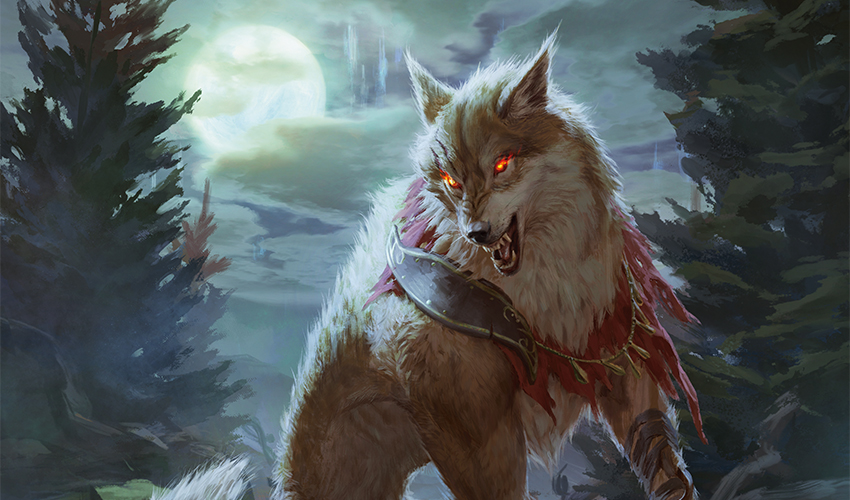Episode 4: Harvesttide
Three knocks on Olivia Voldaren's door put her in a killing mood. Not that she's ever not in a killing mood, of course, but sometimes people take it upon themselves to exacerbate matters, and what is she to do then? You simply can't tolerate these things; it breeds rebelliousness in your servants. And not the fun kind.
"Come in, and do make it worth my time," she calls. "I cannot bear to have my beauty rest interrupted."
She does not open her eyes, for if she does it'll throw the whole thing off. It took her a whole fifteen minutes to flay the face off that maiden; Olivia isn't going to let it go to waste. You must give the blood time to settle in and really lend you color.
"My most illustrious and powerful Lady Olivia Voldaren."
Her lips quirk into a small smile. Yes. Good.
"I come bearing news of the humans."
Her smile and good mood, gone. She scowls, careful not to upset the maiden's face overlaid on her own. "Is this important news?"
"I think so," says the messenger. From the sound of his voice, it was probably Feuer. Didn't he have some bones he should be reassembling? Olivia never met a finer purveyor of ossuary furniture, but why was he here? "They're up to something. Trying to restore the balance of day and night, I believe."
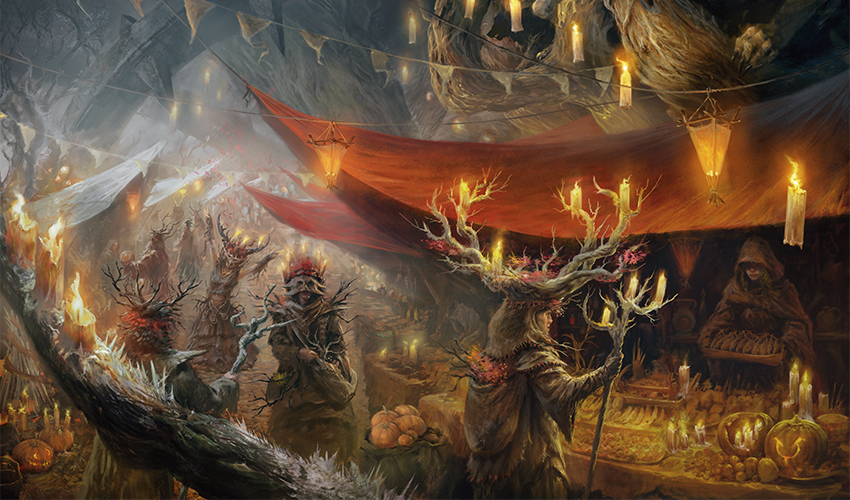
She starts to groan and then stops herself. Mustn't disturb the mask, Olivia, it was such a pain to extract. "And how do you believe they mean to do this?" she says. As she gestures, the blood she's resting in splashes like bathwater. "Isn't as if they can throw a chain around the sun."
"Most illustrious and powerful Lady Voldaren, I believe they're doing it with a festival."
"A festival."
"Yes, a festival," he repeats, firm even after her disbelief. "I was of late visiting Gavony in pursuit of certain physical resources—"
Why won't he just say bones?
"—when I came across the strangest sights: vampire effigies. Large, abominably decorated versions of ourselves, and even of your vaunted, ineffable personage."
"My personage? That cannot stand."
"So it cannot, my most illustrious and powerful Lady Voldaren, so it cannot. In my clever guise as a wandering sword-for-hire, I asked what the preparations were for. A kind woman told me they were for Harvesttide. Thanking her, I killed her where she stood and burned the effigy."
Olivia frowns. "You burned it? Feuer, have some common sense. You should have brought it back here. We could have used it for the reception."
There's the slightest tremor of fear in his voice. "Very well, my most illustrious and powerful Lady Voldaren, it shall be so next time," he says. He clears his throat. "But it may further interest you to hear the method. As I was excavating a specimen I caught sight of a group of travelers—they seemed outsiders, but I recognized their leader. Arlinn Kord—"
"Ugh. That mongrel."
"The very same. She is leading the search. In addition, there was a woman with burning hair—"
Olivia sighs dramatically.
"—who kept asking after something called the Moonsilver Key. She wanted to get a good look at it, which tells me they already had it."
Ahh, that old thing. The humans must be desperate if they're digging it back up. Olivia sits up. "Harvesttide, is it?"
"Harvesttide, indeed. What shall be done? Shall I speak with our other extraction specialists?"
Olivia touches a knuckle to her lips in thought and consequentially the young maiden's, too. "No need. Let it proceed."
"But Lady Voldaren—"
"Most illustrious and powerful Lady Voldaren," she corrects. "Feuer, if you saw someone extracting a specimen you coveted, what would you do?"
He hums in thought. "I would kill them."
He isn't playing along at all. "Yes. Obviously. But when would you kill them?"
"Immediately," he answers. "It'd be a personal affront."
Olivia laughs. "That's where you're thinking too small, dear little boy," she says. At last, she slides the mask off her skin, rubbing the blood into her thirsty skin. "Never interrupt someone when they're doing your work for you."
Among the gathered festivalgoers, a single thought: Innistrad must endure.
From all walks of life, they have come to this place from the nearby foothills of Kessig, from the storied spires and murky moors of Gavony, from the ports and tunnels of Nephalia, from the sunless streets and twisted towers of Stensia, they have come. Beneath the never-turning arms of the ancient Celestus they march their effigies, their candles, their baskets of short-lived flowers and fruits.
Innistrad must endure. This cannot be the last time.
So says the pumpkin carver with a gathered crowd of children before them. "What can I make for you?" they ask, and the children say they would like to see the sun. A sun, then, a sun—the pumpkin carver's hands move with grace and hope and joy. The guts are already hollowed, they explain, and that's the importance of preparation at a time like this, you must think ahead. Make sure to pay attention to your tutors, and they'll tell you the same. Here are the rays, and here is the sun—chunks of pumpkin falling onto the frost-laced earth. A candle in the center. The pumpkin carver, a witch themself, calls down a candle from one of those floating overhead.
"Make a wish," says the pumpkin carver to the child. "It can be for whatever you want, as big as you like."
And the child, of course, wishes that the sun will go on forever, but she does not tell the witch this. If you speak your wishes, they won't come true.
The witch tells the girl to touch the candlewax. A sun and moon engrave themselves on the spot the girl picks, and she draws in a gasp, and the witch smiles. Into the pumpkin, it goes. They hand the girl the finished work.
"Here," they say. "A sun just for you, one that will never go out. Happy Harvesttide!"
And the girl skitters off, carrying her personal sun, thinking that Innistrad is a little brighter. So it is.
Especially when everyone else wants their own personal sun now.
Witch Deidamia watches the girl go and says to themself: this is why Innistrad must endure, this is why it cannot be the last time.
Katilda said it won't be.
Looking up at the Celestus, Deidamia has to hope that's the truth, and they have to nurture that hope, too, have to keep it alight just like the candles.
Even if it's just to amuse these children.
A light frost falls on the proceedings. Only a few yards away, their fellow witches lead defiant songs, coaxing the melodies out from halting voices. Two booths down from Deidamia, their friend Shana holds up a mug of spiced cider. The festival might have a dour cast, and they may well all die in a few months if the sun isn't put back in its proper place, but for now, there is the joy of spiced cider.
Deidamia nods. Shana whispers a quick spell and sends the cup floating onto Deidamia's table, where they take a quick sip in the middle of carving another sun. Shana's eyes say she wants to talk more about what's going on, about how long they're supposed to wait before putting on their masks, but Katilda was clear: wait for the key. Until then, keep your eyes open, and keep the festivalgoers safe.
And so, Deidamia scans the crowd, and the trees, and minds their wards, all as they continue to trap the sun for the children. And, too, for the weary faces of the parents standing behind them.
It is not Deidamia who spots the heroes first, but Shana. Her excited shout gives way to cheers from all around. The bards switch to an upbeat, triumphant tune to welcome them. The crowd becomes so thick that Deidamia cannot even really see the heroes, who have arrived at the other end of the festival, but she sees an exciting gout of flame rise. There was a pyromancer among them, wasn't there?
The boy awaiting his own personal sun shouts for Deidamia to hurry, and so they do—the moment the pumpkin touches the counter, the boy is off to see the heroes. So, too, is the rest of the crowd gone. For the first time all festival, there's an empty table before them.
Shana's table is empty, too. Deidamia can't resist a look at the heroes on their way to the center of the Celestus—a little more cider won't hurt. And Shana will understand, right?
They take a few steps over and pour themselves a new glass, and it's then, as the scent of apples fills the air, that Deidamia feels the too-sharp pain of a ward going down.
The howling starts soon after.
Maybe it was all the apples. Maybe it was all the spices. Maybe it was all the pumpkins. Or maybe it was the collected scent of thousands of humans gathering to stare down their deaths.
Whatever the case, Arlinn doesn't smell them coming.
She doesn't know it's happening until it's too late, doesn't see them beating against the barriers until the shaman-wolves are already upon them, doesn't hear the howling until they're already at the gates. Grateful cheers screech into fearful screams; the children gathered to see them soon return to their mothers' sides.
Witches shout, too, donning their wood and bone masks, directing the crowds further into the imposing arms of the Celestus. "It isn't safe here—you have to go!"
And for the most part, the people listen, becoming a great river of flesh and fear, rushing over the carefully arranged booths and tables, trampling underfoot pumpkins and elders and bottles of cider. Is it blood or wine that soaks the Kessig earth? Who can say? All that matters is that the wolves are at the door, and the Celestus is away from them.
Arlinn can see them now: the howlpack shamans standing among the trees, cloaked in the dyed furs of their kills, the dull scarlet glow of their magic getting brighter and brighter as they chant their spells; the quickest of them running in hungry circles around the edge of the barricade; impossibly large bruisers looming in final threat; wolves in tough, leathered armor.
She can see all of them, and there must be hundreds.
Her chest goes tight.
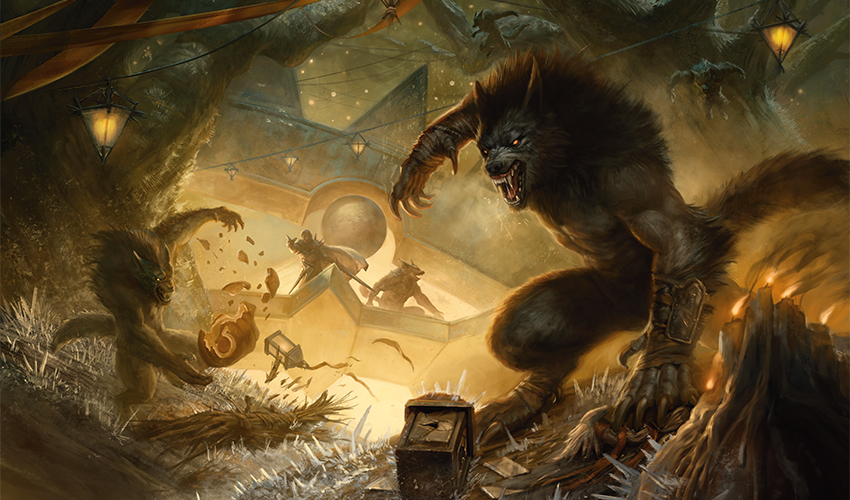
"Arlinn," says Kaya. "We're in it deep, aren't we?"
"Not as long as we can save the humans," Arlinn says. Her voice comes out more strained than she'd like. Shouldn't a leader sound more confident? "Kaya, take the key. Make sure it gets to Katilda."
"Got it," she says. Kaya doesn't need to be told twice—the second Teferi hands her the key, she's off, fading into the mist. Good, the wolves won't be able to find her.
There's a lump fast forming in Arlinn's throat, but she doesn't have time for that now. Red light's painting the stark fear of the crowd in horrific shadow. A lycanthrope only a little smaller than a siege tower beats a fist against the edge of the magical barrier.
Crack.
Arlinn cannot tear her eyes from the horde—from the wolves pacing along with the lycanthropes. If she looks long enough, she is sure to see familiar faces, and the thought fills her with dread. "Chandra, Adeline—"
"You don't need to tell us," says Chandra.
And indeed she doesn't. Adeline, already mounted, throws out a hand for Chandra and helps her into the saddle. The two of them are off to the forefront without another word.
To be in all things a protector and guiding light: that is the core of faith that drives Arlinn forward. And there's no better time to be a protector than this.
So why is it that part of her longs to join them? Why is it that her wild heart beats in her breast, straining against her careful control?
Her gaze soon falls on the answer.
He's here.
Crack. Crack. Crack.
Overhead, the magic shatters like stained glass; she looks up at it with blood soaking her vestments and tears streaking down her cheeks.
A wave against the rocks of Nephalia; the wall of werewolves falling upon the straggling festivalgoers. Blood spraying in the air, bones crunching beneath the massive jaws of transformed death, a howl that sets her alight with self-loathing and hunger.
"Arlinn."
The beating of war drums in her ear nearly drowns out Teferi's voice next to her, but his hand squeezing her shoulder brings her back. She shakes her head, presses her eyes together. "Teferi, I have to—there are people I need to—"
"I know," he says. And he sounds afraid, too, but there's a bravery to his voice that lends her some of the same. "I was going to tell you I owed you a long sunset."
She narrows her eyes, but he's already planting his staff in the earth, already giving her a smile that speaks of confidence he's kindled deep within. "Witches of the Dawnheart Coven!" he bellows, "Let's get this ritual started!"
The second his staff hits the earth, a shockwave spreads, and every muscle in Teferi's body goes stiff with effort. This time, when he looks at her, she knows she can't waste this borrowed time.
Her dreams are dying by the second as are the last rays of the last sunset on Innistrad.
She has to do what she can.
Adeline's a natural leader.
Running through the makeshift battle lines, Arlinn sees this clearer than ever: the gathered guards heed her orders as naturally as breathing. Clusters of cathars stand back to back with spears and shields, driving their weapons into the powerful chests of the wolves. When she commands them to hold, they fall back, forming a shield wall behind which the few remaining festivalgoers can hide.
Tovolar gives no such orders. He has no need to, as Arlinn knows well; he is here for the wild hunt, a thing which knows no law. To run with him is to listen to the wild song of your own heart and follow it to its natural end. She learned that hunting with him. People thought he was quiet because he was mute, but the truth was that he's always been happy to let nature run its course.
And run its course it does—here faster than ever. The orders Adeline's shouting, the gouts of fire from Chandra's gauntlets, the impossible golden rays of the sun: without these things, the humans would stand no chance. Even in their human forms, the lycanthropes are too strong to fight back; even in their human forms, the dires are taller than any blacksmith and wider besides. In some sense, it's a blessing that the majority have yet to change: it is one thing to deal with weapons swung by too-strong arms, and another entirely to deal with living walls of muscle.
But that is not to say it's easy. To her right, a dire brings down his hammer upon a cathar shield wall, leaving three men flat on their backs. Again, and again, and again he brings it down; the cathars grunt in pain and effort, curling up as much of themselves beneath their shields as they can.
It is only a curious stuttering that keeps them alive. One of the rare niceties of Arlinn's childhood were the visits from a traveling merchant. Among his stock was a sort of paper lantern with slits cut into the sides. In the center, a mounted cathar. You could spin the lantern and "see" the cathar ride. Not magic, he swore, simply a trick of the light. Arlinn wanted one desperately but knew her parents could never afford it. The strange movements of the cathar beguiled her, the motion's stop-and-start.
The dire is moving much the same way. Raising his hammer overhead, bringing it down—there are precious seconds throughout where he stops moving entirely. Enough for the fallen cathars to wriggle a little out of the way. Even the dire's shadow doesn't match his movements.
Teferi. She has to thank him after this.
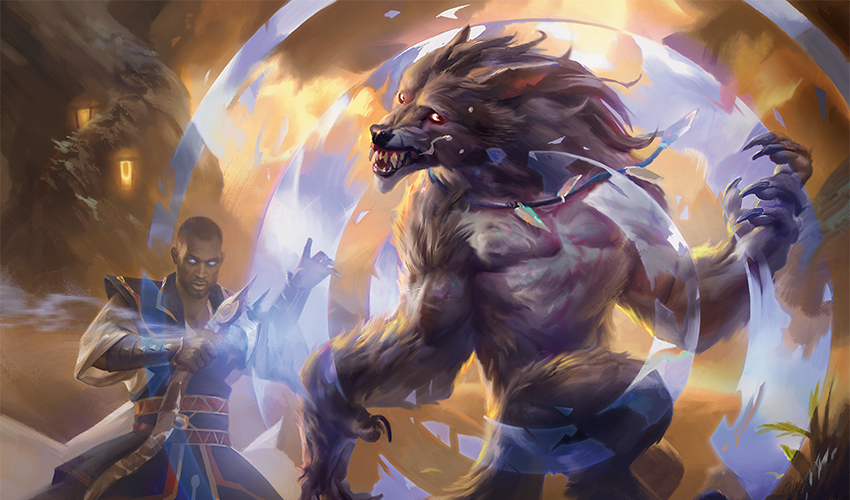
Out of reflex, Arlinn calls for her wolves, but they won't answer, she knows; there are too many wolves among the attackers. Nature's chosen its side.
So she'll choose humanity's.
Scooping up a fallen cathar's mace, she throws herself at the dire. Muscles can lend you all the power they want, but joints will always be weak. He's too busy wailing on his would-be victims to notice the mace coming for the back of his knee. She puts her weight into the blow; a howl and crunch are her rewards. The dire falters, turns, and the cathars stand behind him.
The dire's snarling. Human though his shape may be, the eyes give him away; they're half-changed already, along with his too-long fangs. "You. Tovolar's favorite."
Arlinn scowls. "You don't know anything about me," she answers, hefting the mace. "Get out of here while you can. This isn't a battle you're going to win."
His laugh rumbles out from within his massive chest and distracts him from the coming swords of the cathars. The first through his leg does not stagger him, but the second in his already injured knees sends him howling. The third, between his ribs, bows him but not before he grabs the too-close head of the third cathar in his massive hands.
Arlinn doesn't wait.
The mace meets bone.
Standing in the aftermath, blood on her hands, all she can do is mutter a prayer. When the cathars thank her, it does not feel as if she's done anything just, as if she's done anything right.
None of this is right.
Tovolar's favorite.
She runs, further into the melee.
She runs because it's wrong, and she knows it's wrong—she's never been his favorite, and how could she be? When after two years under his tutelage, she left him scarred and bleeding then ran away in the middle of the night?
She runs from the memory, but memory is a fine hunter: the blood beneath her feet is just like his blood that night; the screams of the festivalgoers are like the screams of the Kessiger foresters; the blood on her hands has never truly gone away.
"Can't we be more than this?" she'd asked him.
But to him, this is what they were, what she was, what she was always meant to be.
Nothing more than this: blood on the earth, the taste of meat, the scent of fear.
Arlinn swallows. The bodies she sees—the people she sees—they're just like the foresters.
And there's Tovolar again. Amid the chaos of the raid, he stands still. Brighter are his eyes than the fires now set to the forest and focused straight on her.
"Tovolar!" she shouts. "Call this off!"
He smirks, shakes his head. "No."
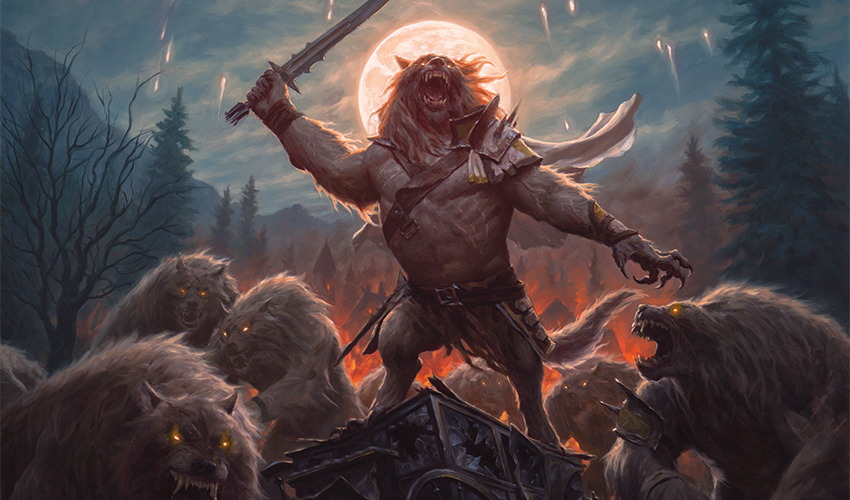
The mace still in hand, she marches. Behind her, the chaos continues: cathars slicing at the throats of lycanthropes; witches sheltering the outliers; armored raiders standing tall in the face of their opposition. Chandra's fires cast the scene in an amber glow.
"It's almost sundown, Arlinn. There's still time to join," he says. He takes no notice of the weapon in her hand or else it does not frighten him.
But it should.
With a deep, guttural growl, she swings.
Tovolar catches the head of the mace.
"Why would I ever want to join you?" she snarls. More and more of her weight she presses into the mace, but he holds it with little trouble.
"You did once," he answers. He pushes the mace back, throwing her off balance. "That was your place."
"You don't get to decide my place," she says. Another swing of the mace finds him catching it by the haft and tearing it from her hands. As it falls, it clatters against the shield of a fallen guard, but Tovolar takes no notice.
The sun's sinking lower in the sky. Even Teferi can't hold out forever.
He stares at her, and she stares at him.
"They only like you because they think you're like them," he says. "But I know you aren't."
"You don't know me," she shoots back.
And this time, he's the one who comes at her—a big overhand swipe of his claws. Arlinn ducks out of the way only for him to pull her closer, to bare the edge of the scars running from his shoulder to his waist. "Are you sure?"
"I am," she says, just before her fist connects with his jaw. The shock of impact up her arm is more than worth it when she sees the smug look on his face shrink away. She follows it with another, and another, leaving him staggering back. "Call this off, Tovolar. There's still time."
Blood drips into his teeth. He spits onto the earth. "You're joking."
"I'm not," she says. "Call this off. Let us finish the ritual. Take the nights back, hunt what you can, but leave the humans out of this."
"And how do you think they'd take that?" he says, standing.
"They'd be alive," she answers. "That's what matters."
He comes for her again. This time, she's ready. Arlinn catches both of his fists in her open hands. Her muscles groan with the effort of keeping him at bay, but she digs in her heels—this can't continue.
"See how far that gets you. Your wolves know the truth—it's us versus them. Always has been."
She knows the howls that follow. She knows the growls, knows what she will see if she tears her eyes from his. So she doesn't look, can't bear to; her chest aches enough already with her heart torn out. To see them will only send it rolling around her stomach.
And she can't afford distractions. Squeezing her eyes shut, she bashes her forehead into his nose. He staggers long enough for her to get in another punch.
But the ripple that flows across his body tells her what she dreads to hear: time's running out. Tovolar's bloodied teeth grow longer and longer, his grin all the more discomforting when it's on a muzzle. All around them the howls of the others giving in stoke the chaos of the moment.
"Arlinn! Going to need some help!"
Chandra's voice is easy to pick out. The answer less so. Staring Tovolar down, the most she can offer is, "Working on it, focus on keeping everyone safe!"
Taller and taller he grows. Her own body fights against her control; her teeth ache, her hands tremble with unspent energy as she scrambles for another weapon. The sword clutched in a fallen guard's hand serves well. Later, she'll say a prayer for him.
But for now? Better to live.
There's joy in him as he lunges for her, there's delight in the swipes he makes—all wild and reckless. Each she meets with the flat of her blade. Quick as he is in this form, the best she can do is fend him off, and it isn't long before her arm aches, her shoulder, her back, her tired, tired soul. A faltering guard leaves her open: his claws tear open her cheek. The smell of blood almost overrides the pain; her nostrils flare, she tastes copper; a deep, primal hunger threatens to overwhelm her carefully won control.
But it doesn't.
"You're a wolf, Arlinn," he snarls, the words mangled by the inhuman shape of his mouth. "No matter how hard you keep trying to pretend!"
"I never said I wasn't!" she answers.
He's on her again, pouncing; she just barely makes it out of his reach.
"Then show me!"
He rears up, the scar she gave him now plainly visible, even in the fading light. Seeing it puts her in that place again: Tovolar urging her to kill humans, to prove she was one of them; an impossible choice; an easy and messy solution. All she had to do was kill him, wasn't it? And then she'd be the alpha of the howlpack.
But things didn't go that way. He didn't die, and she didn't win. They both had the scars to prove it.
Hers are burning. All of her is. In the din of battle, she can hear the drums that played that night when she challenged him. Just as then, the eyes of the pack are upon her; just as then, she stands alone and friendless. Just as then, she is right, and he is woefully misguided.
A spasm shakes her arm, the muscles straining to be something more, but she clutches it with her free hand. A prayer drops from her lips. If she is to do this—if she is to show him how wrong he is—then she cannot give in. She cannot allow herself to—
"Give in. Why are you holding back?"
"Because—because there's still
The words don't come. It's getting hard to speak. Here, again, the howls: I am with you, join the hunt. Here, again, the call of meat and bone; here, again, the finest freedom she's ever known. So close. So close.
She presses her eyes shut. Sense comes to her, and she opens them only a moment later, but by then, the wolves have closed in.
Streak, Patience, Redtooth, and Boulder.
All staring back at her, all with their teeth bared—except Patience.
She presses herself against Arlinn's leg, tugs on her trousers, looks up at her, and begs: Be with us. Join the hunt.
If Tovolar tore her in two, it would hurt less than this. For how can she convey what joining the hunt means? How can she explain to Patience that the humans who look on them with such suspicion are good and the wolves who run and hunt and play with them are in the wrong here?
She staggers. Tears sting her eyes. "I can't," she creaks.
And that is all Boulder needs to hear. True to his name, when he throws his weight against her, she's bowled over, the air gone from her lungs as her ribs crack. Face down in the muck, she can only hear the approach of her wolves, can only feel Tovolar's hands grip her hair.
"We settle this right," he says, "or you die here."
His knee on her back, his claws at her throat. Even to breathe is to risk injury.
"Show me the real Arlinn. We all want to see her."
Is that what he wants, then?
She'll give it to him.
Not because he asks for it, not because her wolves are desperate to see it, not because she wants to prove something.
But because in some ways he's right—the two of them are wolves, and she sees now that it was only ever going to end like this.
By blood, and fang, and claw.
The sun sinks below the horizon. Day changes to night.
And Arlinn Kord changes with it.
